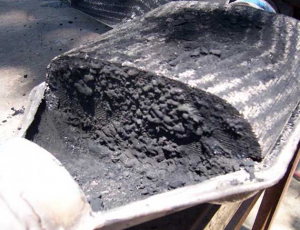A diesel particulate filter (or DPF) is a device designed to remove diesel particulate matter or soot from the exhaust gas of a diesel engine.
Wall-flow diesel particulate filters usually remove 85% or more of the soot, and under certain conditions can attain soot removal efficiencies approaching 100%.

A Blocked DPF
Some filters are single-use, intended for disposal and replacement once full of accumulated ash. Others are designed to burn off the accumulated particulate either passively through the use of a catalyst or by active means such as a fuel burner which heats the filter to soot combustion temperatures. This is accomplished by engine programming to run (when the filter is full) in a manner that elevates exhaust temperature or produces high amounts of NOx to oxidize the accumulated ash, or through other methods. This is known as “filter regeneration”.
Cleaning is also required as part of periodic maintenance, and it must be done carefully to avoid damaging the filter. Failure of fuel injectors or turbochargers resulting in contamination of the filter with raw diesel or engine oil can also necessitate cleaning.
The regeneration process occurs at road speeds higher than can generally be attained on city streets; vehicles driven exclusively at low speeds in urban traffic can require periodic trips at higher speeds to clean out the DPF. If the driver ignores the warning light and waits too long to operate the vehicle above 40 miles per hour (64 km/h), the DPF may not regenerate properly, and continued operation past that point may spoil the DPF completely so it must be replaced.
Some newer diesel engines, namely those installed in combination vehicles, can also perform what is called a Parked Regeneration, where the engine increases RPM to around 1400 while parked, to increase the temperature of the exhaust.
DPF And The Law
The UK Government announced a change to MOT testing from February 2014. MOTs for diesel vehicles are to be tightened to ensure that DPFs fitted as standard are still present.
From February 2014, garages and testing stations will be required to check for a DPF in the inspection of the exhaust system as part of the MOT. Vehicles will automatically fail if one is not present, where it should have been fitted as standard
This means the practice of removing DPFs for performance gains, or to bypass the cost of cleaning or repairing clogged filters, will be policed more thoroughly. Currently it is an offence to drive a vehicle if a DPF has been removed.
We specialise in DPF repairs and replacement and can advise on many technical issues related to their function.
Are You Having Problems With DPF?
We specialise in DPF repairs and replacement and can advise on many technical issues related to their function.
Sometimes it is not possible to clean or repair a DPF as it it has become too blocked. If this is the case we can obtain and fit a new DPF.
Frequently we find that when a DPF has been removed rather than cleaned or replaced then the back pressure that the turbo relies on is altered. This means that performance is seriously affected which will lead to inevitable early failure.
Fully Approved By Bosch and Delphi
As a Bosch Diesel Center we are part of the international diesel workshop organisation of Bosch, the leading supplier of modern diesel technology and No. 1 in development and original equipment of Diesel Systems.
Delphi Service Centres are a network of independent garages around the world. Each garage benefits from Delphi’s comprehensive offering of parts, tools, diagnostics, training and technical support. Delphi provides valuable knowledge of the technology the market will see in cars today, tomorrow … and ten years down the road. Patterson Diesel are also the appointed main agents for Denso, Stanadyne and Zexel.
Please contact us for more information
